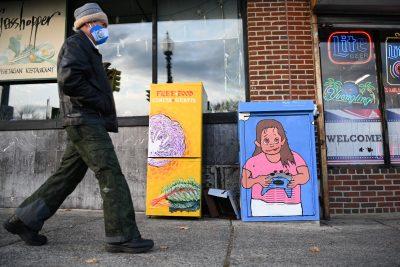A community fridge and pantry opened in Fenway Monday to serve those experiencing food insecurity, which has grown in prevalence since the pandemic began.

Organizer Ariana Goncalves said the fridge is open to anyone who needs it.
“I really, really want it to be a place where anyone could feel welcome,” Goncalves said. “They didn’t have to tell me their names. They didn’t have to tell me their story or explain why they needed food.”
Food is a “basic right,” Goncalves said, so she wanted to do her part to address food insecurity.
Food-insecure individuals lack consistent access to healthy and quality food, said Megan Schraedley, an assistant professor of organizational communication at West Chester University who has researched food security.
The fridge’s host Mei Mei, a Chinese-American restaurant located on Park Drive, provides a home and electricity for the fridge, according to Goncalves. The restaurant’s owner reached out to Goncalves over Instagram after hearing about the idea.
Fenway is home to homeless and student populations, which she said makes it a good location for the fridge.
Goncalves was inspired to open the fridge by a tweet from a musician encouraging their fans to donate to a community fridge in Los Angeles.
While looking for a host, Goncalves held weekly events from July to October where she passed out food in Downtown and the Back Bay.
Unlike other local fridges that are backed by non-profits, Goncalves said she organized the fridge on her own.
Within less than an hour, Goncalves crowdfunded for the money to purchase the fridge, the materials to build its shed and transportation to move the fridge to Mei Mei, she said.
Those who want to help can drop off fresh produce and nonperishables at the fridge, Goncalves said. Volunteers may sign up to clean the fridge, which must be done at least three times per week.
The fridge also offers care packages with toothpaste, deodorant and other hygiene items, Concalves said.
For those who want to start a community fridge of their own, Goncalves said it is important to focus on building connections with the community and utilizing social media platforms.
“It’s okay to get discouraged. It’s okay to know that this is hard,” Goncalves said. “I have to just stress to just use your community because they’re there for you.”
Schraedley said food insecurity is often stigmatized.
Rather than directly asking friends and neighbors if they have enough food, people can exchange food and favors, she said, so that no one feels like a “charity case.”
“Maybe bake them a loaf of bread,” Schraedley said. “Then ask them if they can lend you something or if they can teach you how to do something in exchange for that food.”
Media outlets should normalize food insecurity and explain that many are affected by it, she said. Making information about food pantries and markets more accessible, she added, will ensure that food gets to those who need it.
“The more compassion and community we can show and build at this time,” Schraedley said, “the better off we will all be.”





















































































































